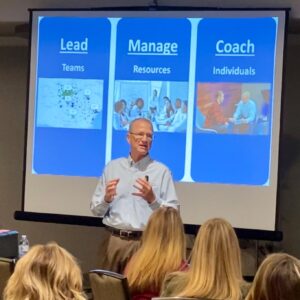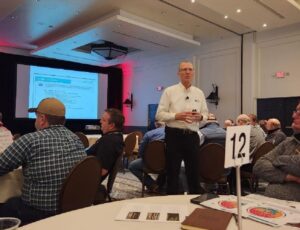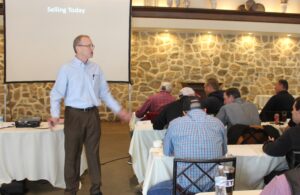Failure teams up with Fear to form one of the most powerful sales killer: The Fear of Failure
This is Part 2 of a 5-part series on the Five Sales Killers. See previous articles at
Like many things in life, selling is a game of failures. You fail often before you get better, before you figure out what works and what doesn’t. We’ve all heard the story of how Edison tried hundreds of times before inventing the light bulb. Or how most billionaires went broke on their way to financial success. Yet they persisted. See what Ray Kroc had to say about failing and persistence on his journey to build McDonald’s 7 Lessons from the Founder. Great stories for sure, but often, we may not have the persistence to stick with failure 499 times like Edison did. Nor will our employer allow us to repeatedly fail financially until we get it right.
We head out every day into our sales territory and make prospect calls, cold calls, customer calls. We ask questions, make presentations and then ask a closing question. And we run smack dab into the face of failure. What does it sound like to us?
“No”
“That won’t work for us.”
“We aren’t going to make a change right now”
“We can’t afford something like that”
When too much of this occurs, Failure’s Evil Twin shows up – Fear. Fear merges with Failure to form one of the worst forces you can harbor inside your head: The Fear of Failure. With these two forces whirling around in our head as we drive down the farm roads, we quit trying. We dare not venture:
– We don’t ask the deeper question for fear of offending the prospect.
– We don’t ask the Closing question because the sales call is going so well and we don’t want to ruin it with a negative interaction. We also don’t want to hear “No.”
– We don’t call our manager to ask for a custom product for a prospect because of her reaction to this in the past. She lectured you for 10 minutes on selling your branded products instead of always customizing.
– We don’t raise our hand in a meeting and ask for an explanation because we think we should already know the answer.
– The absolute worst of all. We don’t call on the big accounts. Maybe they were gruff or short with us when we called on them previously. Maybe the big account acted like he was too busy to even talk to us on the phone and we don’t want to appear pushy. We may fear we are not knowledgeable or important enough to call on him. So, we just drive right past his farm road.
4 Ways to Fail at Failing:
Several of these pieces of advice is going to sound contradictory to each other because they are. You need to persist to get through the tough times but let go of what isn’t working. It’s a balance. Luckily as the leader of your territory, you get to choose which path to take.
- “We tried that once and it didn’t work”. Balance the experience on your team with the energy of trying it again. Dig into when they tried it once. Who tried it? How did it fail? Are there others in your company that can shed some light on that previous try?
- Failing and not adjusting your approach: The old saying about the insanity of doing the same thing and expecting different results fits here. You need to learn from your mistakes. Make adjustments and try again.
- Adjusting your approach with no process: Don’t just take wild guesses or shots in the dark as to what might work. Learning from your mistakes is a start, but you need to have a thought process and measure it. Reach out to those in your company that might be going through similar situations. I’m always amazed when facilitating a sales training session and someone shares a problem. All of a sudden, it’s like a chorus of, “Yeah, that happens to me too.” I always wonder, what if that person had not raised their hand to ask the question? Would they have all sat there in silence, afraid to share their problem?
- Attitude: High Hopes or Low Expectations. This is not a one answer fits all situation. All the social media posts tell us that we have to aim high, expect the best and choose our attitude. I agree and that’s great. But, I have one question for you. How do you react when those high hopes and great expectations meet failure or a setback? You have to know how you react to success and failure. I love positive and high-spirited people just like the next guy. But be wary of getting too set on a positive outcome. When it doesn’t happen, it can be devastating. So, keep some perspective. I observed this with Mary, a fellow salesperson. She would be higher than a kite on a new product or a prospect she just found. Then, she would hit some rough patches with this promising prospect or new product and just like that, she was devastated. What happened to her high hopes? More importantly, why did she take a little set back so hard? Mary worked hard with her sales coach to get some perspective on both ends of the spectrum. She became a little more cautious going into a promising prospect and not so devastated when it didn’t go perfectly as planned.
3 Quick ways to kick Failure in the “upper thigh”
- Play the Reframe Game: Think of failure as
- A small set back on my way to a breakthrough.
- It only cut off part of my path forward. Great! Now I don’t have to try that method anymore.
- Maybe it’s just “No” for now. Not “No” forever.
- If it’s not fatal, Failure is a lesson. For some of us, this is the only schooling we get after leaving college.
- Ask: What can I learn from it? Wandering into my boss’s office after making a $12,000 formulation mistake, I was dreading the outcome of this discussion. My worst-case fear scenario had me getting fired. After the discussion was over and I didn’t get fired, I remarked my amazement to my boss. He said something that stuck with me. “I just spent $12,000 on your tuition, why would I fire you?” We laughed, but I know on both our minds was, “that better not happen again.” And it didn’t. Several years earlier, I learned that outside of the US a ton is a tonne (2200 pounds). Not a huge deal if you are buying a 25-ton truck. However, it’s a really big deal if you are trying to hedge a 10,000-ton (tonne) boat. I can still remember the VP asking me if I hedged US tons or metric tonnes. “Uh-oh” was that horrible feeling that went through my mind as I tried to find the right words to tell him. I can’t tell you how badly I wanted to tell him I covered metric tonnes. But I didn’t. Which meant I was unhedged on nearly 1,000 tons of soybean meal. I was very glad this was also part of my tuition versus termination.
- Ask: Who else deals with this type of problem? Working with ag sales teams across the country, I’m amazed how similar some of their problems are. Maybe not all the details, but the basics of the problem are very similar. So, upon your next failure, reach out to someone in your network that may have gone through this problem before. How did they deal with it? If you are the first, then congratulations! You get the Sales Explorer Badge. You’re original.
It’s not enough to just tell you not to let fear or failure kill your sale. To me, without the how, those are just hollow words. I hope you incorporate the three coping methods above into your selling skills. The last piece of advice on failure I will pass on reluctantly is – Let it Go.
I’m reluctant because I don’t like passing on advice I don’t follow so well. This one is tough for me because I will hold onto the failure experience at times for way too long. Then I get some perspective and remind myself that it wasn’t fatal and it was a good lesson and I learned from it. But, as you can see, my metric tonne experience happened 25 years ago and I can still remember it like it was yesterday. My tendency is to downplay my successes in my mind and often dwell on the failures. The mind game that I play is to turn the failures into epic adventures where I learned a lot. Remember, you have to have some “knocks” in your “school of hard knocks.”
Join me next time as we deal with the really exciting sales killer: The Mundane of Selling.




